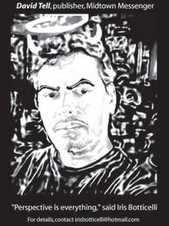Thursday, August 23, 2007
MM Daily Dispatch
Birth of a Legend
Yeshua wasn't the first little Jewish boy to be considered too precious by his mommy to be fully of this world—nor the last. (Just the most famous.)
By David Tell, (c) 1999, Merkureal Communications. All Rights Reserved
A child was once born in the stable at an inn. But that is not how this story begins ...
A weltering breeze played through the vineyards. A few more olives dropped to join those in stages of waste. Earlier windfallen were beginning to suffer of neglect, losing their plumpness and sheen and on their way to joining those of last season they lay among, themselves almost raisin-like—wrinkled, wizened.
Yosef sat under a palm, a skin of raw wine at hand, a rough platter with crumbs of honey-cake and the stems of several figs attracting ants on the ground nearby. A disturbance of dust in the track a few score yards away dissipated enough on its nearing to unveil a familiar merchant and his overladen asses.
“Yeshua!” called Yosef to the young child engrossed in something in the earth, close to the track. Though the traveler, his and his animals’ pace an ambling one anyway and slowing now, presented little danger to the child, Yosef spoke again, more sharply. “Ye-shua! By my side! Attend!” The boy scrambled to him, some kind of many-legged prize in his grubby hands. “My lord, abba, here I am!” cried the boy.
Yosef signed to the merchant, no need to stop, no chance of a sale. To Yeshua, mock-sternly now, a dusty eyebrow raised queryingly: “You want a potch im tukas?” An “in-joke” and endearment: He knew what it meant, the boy knew what it meant; it was all the more fun, and—when necessary—potent in effect for all that it was nonsense-talk to anyone else.
“Abba, abba, I wanted to save it!” Father and child inspected the ruin of a little “city” by the roadside, pebble structures and clay walls toppled by the hoofsteps, dung beetles plodding amid, oblivious. A tear left a track on the boy’s dust-smeared cheek.
“In our secret heart, a son should grow up savior of all our cities,” muttered Yosef. “You want to be a great judge, or a healer?” He tickled the boy. “I want to be king!” he cried. “Eh, my scion of David,” said Yosef. “Or you could be, maybe, a rabbi, why not?”
He snaked his right arm around the boy’s middle and hoisted him up to his hip, outthrust to support him like a sack of millet, Yeshua with hands free to guard his prize and legs trailing. And giggling at Yosef’s hardly feigned grunts and clumsy efforts to hike him up, get his hip under the increasingly solid weight of the boy.
“Miryam! A sack of grain for you to grind! Throw this good-for-naught sack in the cellar, get it out of my sight. What a load!”
“Forget the nonsense, what did you leave roadside, eh? Get me the platter, and bring in the wine, no more for you, you goodfornothing.”
“Mama, look what I saved!”
“Eh, what is it? Saved, for what?” she sniffed. “Eh (nonplused, disgust all a show), vermin you bring in. Yosef! Make this crawling thing scarce, and you with it. Bring me the things, then patch the netting before all the olives are a waste, trodden into the dirt, eh? Eh! Let no more wine pass your lips, and you had better not have trafficked in the way with our bit of silver, or my sweet-cakes, for that matter.”
“I ate them myself!” he protested thickly, drawing from her a scathing glance, and another sniff.
“Ate, and drank, and drank some more, you goodfornothing,” she said. “Yeshua, what a man I’m tied to, what a figure. Him you show how to live,” she added, addressing Yosef, though not looking his way. “What a man. What man? What husband?”
“Ema!” cried the boy. “Please don’t yell at abba.”
“Some daddy!”
“Mama!”
With the side of a long finger, Yosef rapped the boy sharply on the shoulder, glanced a silencing glance.
“Don’t touch the boy!” shrilled Miryam. “My precious. My baby. My angel!”
Yosef went to embrace her, to silence her, too, but she stiff-elbowed him from her even as his arms barely clasped her around the shoulders. Yeshua ran to join the embrace he hoped he saw, but as Miryam’s elbows burst Yosef’s hug, his arm flung the boy away too, his bony knuckles rapping the boy’s temple so that he cried out.
“Yi! You hit this boy? You, you, you goodfornothing!”
Yosef suddenly stood on his dignity. “Do not speak to your husband, this child’s father, so! Shame! Know your place, know ye mine!”
The boy’s and mother’s attention were both caught in this outburst. But Miryam laughed. “Your place? Your place is in the market, where you squander your time, our hard-earned coppers, our harvest, our hopes. What are you? Your place? Your place is out there, neither by this hearth nor in my bed. This child’s father? What a father. I’ll tell you father. As much a father as you are, God almighty should be his father. Unseen, yea, as much a father as you to him He is, what little we have by His leave, thank you for it I will not!
“Yeshua, Yeshua, my precious, my little lord, so beautiful, sweet and perfect, he could have come only from the Lord Himself! Ha, when thou liest out in the dust in drunkenness, who liest with me? For such an issue, only the Lord God Himself could have known me. Never you! Never thy stinking, drunken, pawing embrace, to bring such a child. The Lord God is his father! Don’t dare seek such due. It is above you to claim!”
Yosef glowered. Yeshua looked wide-eyed from one to the other. Yosef’s brimming anger spilled over onto the boy, how could it not? He strode out—Miryam clutched the child to her—the child, eyes bright, brimming too, though no hot tear fell.
Over time, after much of the same, Yosef became embittered and estranged. Who could blame him? When Yeshua left home, he fumed and drank even more, and Miryam loudly disavowed him.
A rare visit home for Yeshua, father and son simmered with resentment.
“If you won’t trim your hair, at least comb it,” said Yosef. “And that beard—if it can even be called that, you young Sadducee!” Yeshua just looked at him disdainfully.
“And why don’t you get a job—will you?” bleated Yosef. “Oh, like you?” Yeshua couldn’t resist retorting.
As if he hadn’t heard, Yosef went on: “Maybe then you can find a respectable girl. A nice girl, what’s so wrong, start a family. Make an old man happy. Even yourself, you should be so lucky.”
It was all Yeshua could do to turn the other cheek. “You’re not good enough to kiss the ground my Miryam walks upon. My Miryam Magdalena—don’t you utter her name. Nor that of my saintly mother, you ...”
“Ha, saintly!” spat Yosef, but grinning. “Reminds me your hallowed birth. To hear your mother tell it, great sages bowed down, kissed your little baby feet, anointed your pupick, bestowed great gifts. What a joke. Traveling salesmen, no more. Here for a convention. Balm and unguents? What’s a little pip like you want ’em for? They fancied your mama, the swine. Golden bands that graced her neck oh so dainty, the vagrants almost forgot: how cute on your humid little brow, too. Best I can say for her, she was clueless their motives—she sure did covet their wares, though.”
Silence ensued. Yeshua left with a controlled calm, a tense dignity. An aggrieved humility.
This tiff did nothing to temper his obstinate provocations to authority: local, temporal, imperial, priestly, divine. Passive-aggressive, some called it: “King of the Jews?” “That’s what you say.” Nyah. Still, kind of unassuming. And it was hard to put your finger on anything wrong in what he himself said, though by the time it reverberated through the throngs and rabble, is it a surprise he’d be fingered for an example? Nice Jewish kid gone wrong—not so wrong, but you know, wrong place-wrong time, family-of-origin issues, how it goes.
Later—bearing up pretty well, considering—he reflected. “Abba, abba, why did you forsake me?” he moaned.
This short story has been rejected by Harper’s, The Atlantic Monthly, Playboy and The New Yorker magazines.
Subscribe to:
Comments (Atom)


